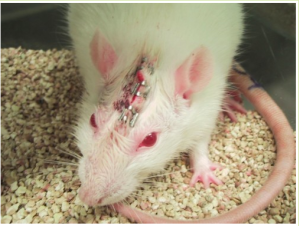Ethics is a scary word. It relates to what is and what is not right, or morally just. The problem with ethics in research (or any area for that matter) is that individuals will have different standards as to what they deem right or wrong. For this reason – and I’m sure many others too – a Code of Ethics was developed. This code outlines various standards to follow when working in the media, including being honest, fair, independent and showing respect.
A major aspect of ethics in research is allowing volunteers to be autonomous, or informed and self-controlled participants. An example of this not being the case was in Stanley Milgram’s experiments, where he tested how much pain volunteers would be willing to inflict on another human in the name of science.
In the 21st century, it can be seen that many research companies are doing ‘better’ when it comes to human subjects. But what about animal subjects?
Animals do not sign a consent form, they do not have experiments read out to them, their privacy is invaded, they are violated and they are not treated with respect. This all sounds unethical. What is the difference between animals and humans and why is it wrong to do this to humans but not animals? Is it because they can’t say no? Because there are some humans that cannot agree to or consent to being included in research; such as babies, or severely disabled individuals, yet they are not tested on and used for research. And I’m not talking about medical research – not to say using animals in medical research is not of great ethical concern – I’m talking about using animals to test cosmetics and other western appearance enhancers. The products you see in magazines and in advertisements on television. In 2013, the European Union banned the testing of chemicals, ingredients and completed products on animals. Meaning if a company wants to be a part of the European Union, they cannot test on animals. However, some companies have been testing on animals overseas, and then flying the product back home to sell.
NB: Sign an easy petition to stop this here.
This definitely relates to media research ethics and not just research ethics on a more broad scale. If consumers do not know or understand the extent to which products they are buying are testing on animals, then data on consumer satisfaction may be untrue. Also, when companies use people who are in the media to endorse their products, this is taking the focus away from the real issue at heart and pressuring society to buy certain products in order to be beautiful.
In order for consumer research to be ethical, i.e. what products will they choose or choose not to purchase, the research and product development should be ethical in the first place. And this is very relevant to the media when celebrities are used as endorsers and the media continues to feed this hysteria around needing beauty products to be beautiful.
Photos sourced from PETA




Hi Deanna,
This is a really interesting and informative post! I am using this topic as part of my research. I am analysing the differences between human and animal abuse specifically on Facebook. This has really given me more perspective on the topic and has given me some really great sources!
I like the approach that you have taken to get the audience’s attention with the distressing photos of the animals and really ‘pushes home’ the issue.
I loved this post, it was a really good read.
Also, when going through research on this topic I also found this website for ‘animal activism’. I noticed there was a section on animal experimentation and thought it would be a great addition to the blog post as well.
http://www.peta.org/about-peta/?category_name=faq+animal-experimentation
-Tessa